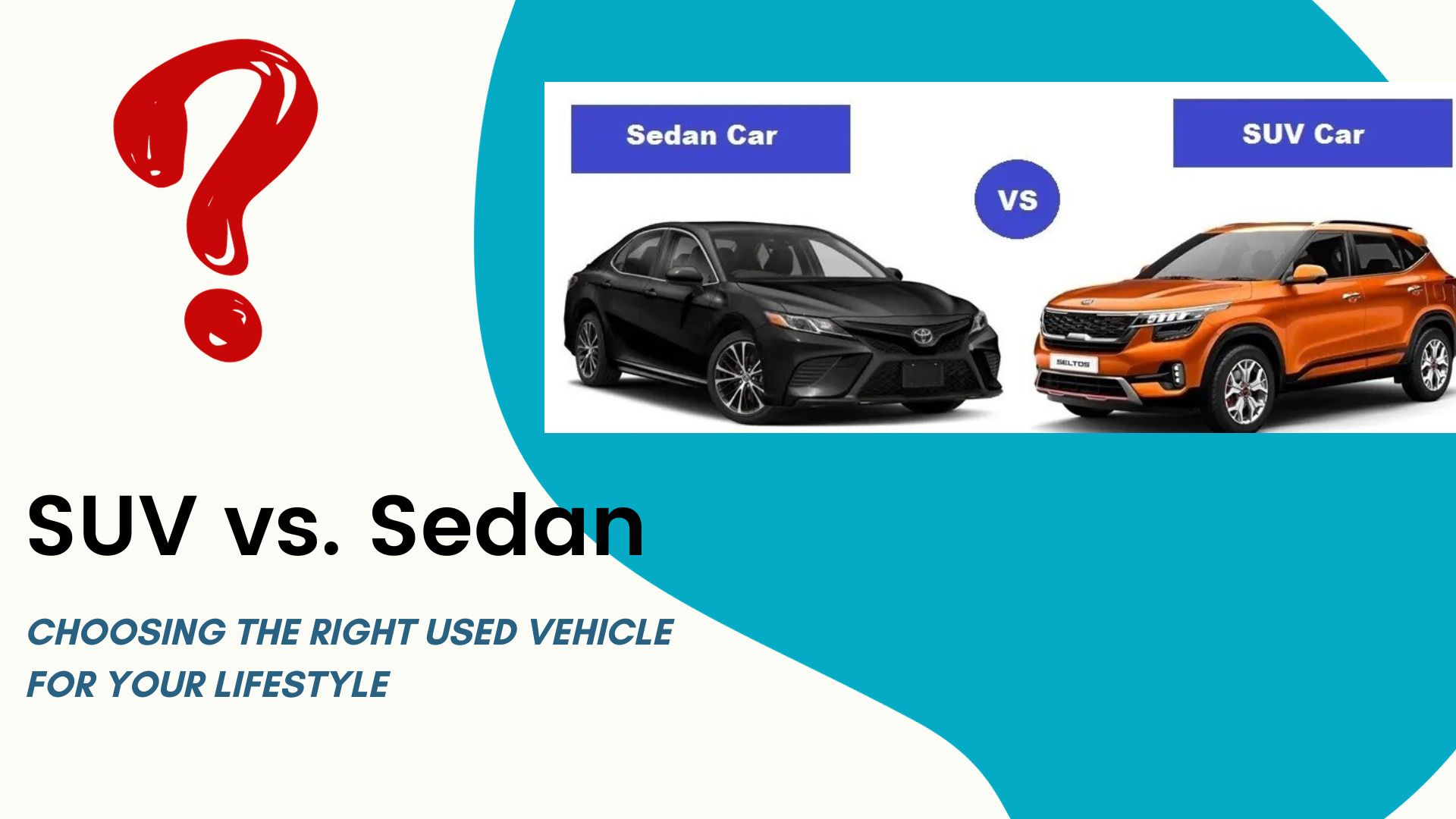-
1Personal Info
-
2Address Info
-
3Income Info
-
4Vehicle Info
-
5Review
SUV vs. Sedan: Choosing the Right Used Vehicle for Your Lifestyle

Choosing a used vehicle is a significant decision that involves considering your lifestyle, needs, and preferences. Two popular options you’ll often encounter are SUVs (Sport Utility Vehicles) and sedans. Each has its unique advantages and caters to different lifestyles. In this article, we’ll explore the key factors to help you decide between an SUV and a sedan when buying a used vehicle.
SUVs: The Versatile All-Rounder
SUVs have gained immense popularity over the years, thanks to their versatility and spaciousness. Here’s what you need to know when considering an SUV:
Size Matters
SUVs come in various sizes, from compact crossovers to full-sized SUVs. The choice of size depends on your specific needs. Larger SUVs offer more seating and cargo space, making them suitable for families or outdoor enthusiasts. Compact SUVs are maneuverable and fuel-efficient, ideal for urban dwellers.
Off-Road Capability
Many SUVs, especially those with all-wheel or four-wheel drive, offer excellent off-road capabilities. If you enjoy outdoor adventures like camping or off-roading, an SUV might be the right choice.
Towing Capacity
SUVs often have higher towing capacities compared to sedans. If you need to tow trailers, boats, or other heavy loads, an SUV is a practical choice. Get used cars for bad credit near me at iGotCars.
Cargo Space
SUVs typically offer more cargo space than sedans, and many have adjustable rear seats or additional storage compartments. This can be a game-changer if you often transport large items or require extra space for road trips.
Passenger Comfort
SUVs tend to provide a higher seating position, which many drivers find comfortable. Passengers enjoy ample legroom and headroom, making long journeys more pleasant.
Safety
Due to their larger size and weight, SUVs often offer a sense of security on the road. They can be safer in collisions with smaller vehicles. Additionally, many modern SUVs are equipped with advanced safety features.
Sedans: The Efficient Commuter
Sedans are known for their practicality, efficiency, and ease of handling. Here’s what to consider when thinking about a sedan:
Fuel Efficiency
Sedans are generally more fuel-efficient than SUVs. If you have a daily commute or prioritize fuel savings, a sedan may be the better choice.
Maneuverability
Sedans are known for their nimble handling and ease of maneuvering in tight spaces. They excel in city driving and are a breeze to park.
Lower Maintenance Costs
Sedans often come with lower maintenance and repair costs compared to SUVs. Their components tend to be more affordable and readily available.
Affordable Insurance
Insurance premiums for sedans are typically lower than those for SUVs. This can lead to significant savings over time.
Aerodynamics
Sedans are aerodynamically designed, which can result in better fuel efficiency and a smoother ride at higher speeds.
Easier Entry and Exit
Sedans usually have a lower ground clearance, making it easier for passengers to enter and exit the vehicle. This can be beneficial for those with mobility issues or young children.
Factors to Consider
Now that we’ve explored the advantages of both SUVs and sedans, let’s delve into the factors you should consider when making your decision:
Lifestyle: Assess your daily routine and activities. If you need ample cargo space, have a family, or enjoy outdoor adventures, an SUV might be the better fit. On the other hand, if you primarily use your vehicle for commuting and prefer fuel efficiency, a sedan is a practical choice.
Budget: Your budget plays a crucial role in your decision. Generally, sedans are more budget-friendly in terms of purchase price, fuel costs, and maintenance. SUVs, especially larger ones, tend to have higher upfront costs and operational expenses.
Fuel Efficiency: Consider your long-term fuel costs. If you have a lengthy daily commute or prioritize minimizing fuel expenses, a sedan’s superior fuel efficiency might outweigh the advantages of an SUV.
Parking and Maneuverability: Think about where you’ll be driving and parking most frequently. Sedans are easier to park in crowded urban areas, while SUVs may require more space.
Passenger and Cargo Needs: Evaluate the number of passengers you’ll be carrying and the amount of cargo space required. If you frequently transport family members or need to haul equipment, an SUV offers more flexibility.
Resale Value: Research the resale value of the specific makes and models you’re considering. Some vehicles retain their value better than others, which can affect your long-term costs.
Safety Features: Assess the safety features available in both sedan and SUV models. Modern vehicles come equipped with a range of safety technologies, but the availability may vary.
Test Drives: Ultimately, take both sedans and SUVs for test drives. The way a vehicle handles, its comfort, and how it suits your driving style are essential factors in your decision.
Choosing between an SUV and a sedan for your used vehicle purchase is a personal decision that depends on your unique circumstances and preferences. Both options have their strengths, and the right choice comes down to what best suits your lifestyle, budget, and driving needs. Whether you opt for the versatility of an SUV or the efficiency of a sedan, a well-maintained used vehicle can provide reliable transportation for years to come. iGotCars offers in house financing no credit check.
